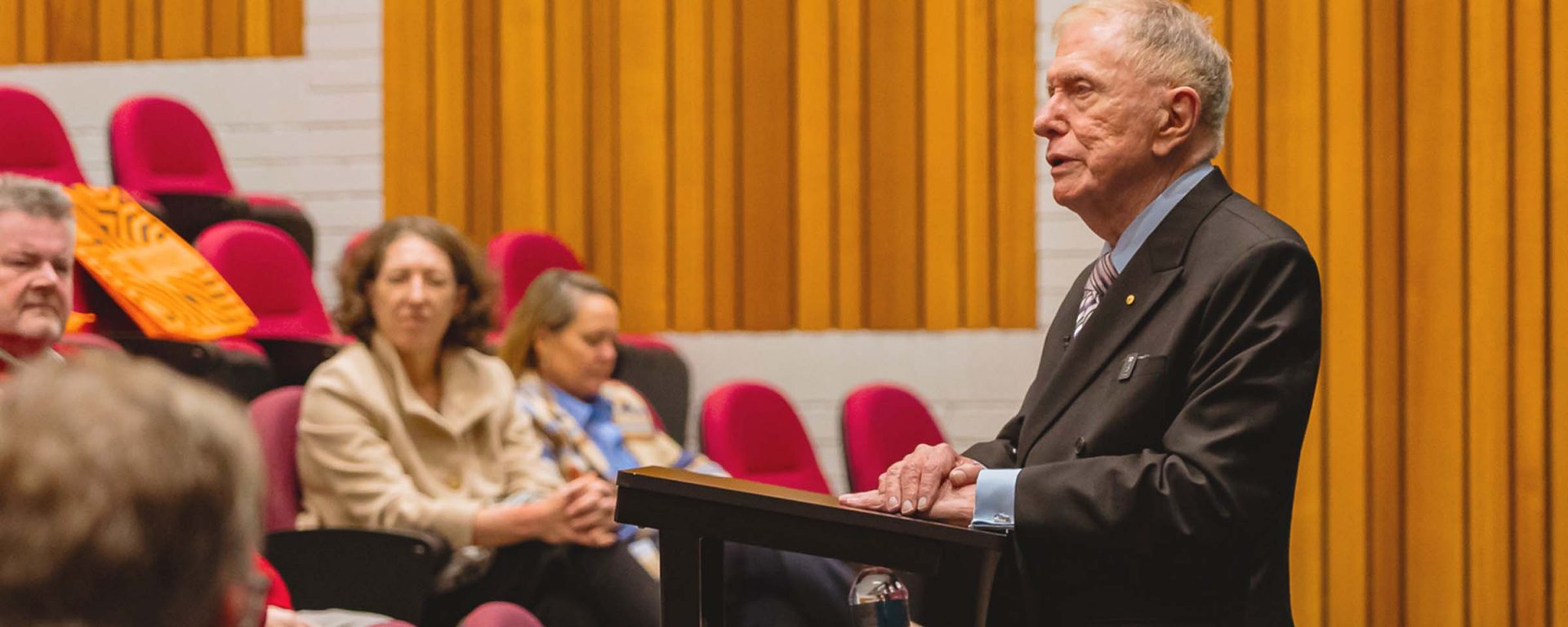Lawyer. Judicial officer. Law reformer. Protector of international human rights for the United Nations and the World Health Organization. Prolific author. Advocate for LGBTIQA+ rights and HIV/AIDS research. National Treasure. The Hon Michael Kirby is many things. He was also a member of the High Court of Australia from 1996 to 2009. He knows law and has thought deeply about the legal system and its role in society. So, we asked him why law is important and what it means for us as Australian – and global – citizens.
Why law is important for everyone
“I keep the UN universal declaration of human rights in my pocket. My primary school teacher gave it to me because it was adopted in the United Nations General Assembly just after the Second World War. The president of the assembly at the time was an Australian, Dr Herbert Evatt. He was in the chair when this statement on the human rights of people everywhere was adopted, and so we were taught it in school. It wouldn’t be a bad thing if we went back to teaching kids of primary and secondary school about these fundamental human rights.
“The first article is: all persons are born free and equal in dignity and rights. And that’s not a bad banner for human beings everywhere. I believe it and I believe we should teach it, and I believe we should practise it in our lives.
“The alternative to law is a world of power, guns, influence, secret deals. Law is the way to bring into the public space the peaceful resolution of conflict and the assertion of fundamental human rights. And to make sure they are respected not just for the powerful and rich, but also for the powerless and poor.”
The impact on peace
“The wonder of life and the opportunities that we all have to share in the rationality of the human species and to make a contribution in our own country, in our own region, but also internationally in this age of nuclear weapons and climate change and all the other problems, to make the world a better and a safer place. And that is an obligation of all human beings, but a particular obligation of those who have had the blessing of education in a country like Australia.
“The human species is diverse. There are people of different genders, sexuality and ethnicity. Law lays down the groundwork for people living together. We are one of the very few countries in the world that doesn’t have a constitutional charter of rights or even a statutory charter of rights. It’s a hot topic in Australia at the moment.
“Law is about justice and power. So if you’re concerned about your fellow human beings, and righting wrongs that have been done to them, then law has a role to play. It strengthens politics and it also materialises religion. Moreover, its an opportunity to be close to the levers of power and work them for the benefit of mankind.”
Reconciliation
“Law can help to bring harmony where there has been conflict. In the past there have been conflicts between First Nations people and the descendants of the settlers. And there are still conflicts and injustices. Law has a role to play in addressing those injustices and making sure that we all live together in harmony and peace, understanding and having knowledge about each other. This is why nowadays we have an acknowledgement of country, but it has to go beyond that. You have to acknowledge humanness and the wrongs of the past. Law can also help address those wrongs and make sure they’re not repeated.”
On studying law at Charles Sturt
“You’ll learn from highly qualified teachers who will explain a very complicated discipline. Moreover, you’ll pick up the values and qualities necessary to be concerned about justice. Being concerned about law is important and it reconciles differences. But if you’re also concerned about justice that is a contribution to kindness, friendship and peace. All the aspects of the law offered by Charles Sturt are a gateway for the mind into a helping vocation. That’s what makes life interesting and worthwhile.”
“There are lots of great law schools in Australia. Charles Sturt adds the special features of natural resources. The compulsory subject of international law that I certainly support. And its emphasis of the principles of fundamental human rights and also the rights of Indigenous people. At Charles Sturt, they ingrain that issue into all the subjects. Moreover, it is not just a formality. There is deep thought about how we reconcile ourselves to our past and to the people of the First Nations in our country. So as to bring, rather belatedly, full justice and equality to the Indigenous people of this continent.”
Inspired to make your mark in law?
Start with our Bachelor of Laws.
Hear more from the Hon Michael Kirby
Banner image: photography by Pat Greer

